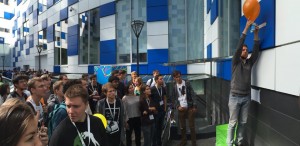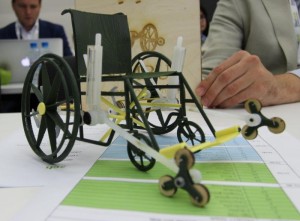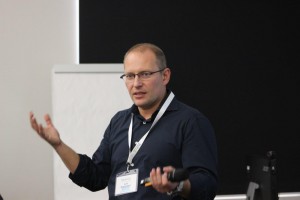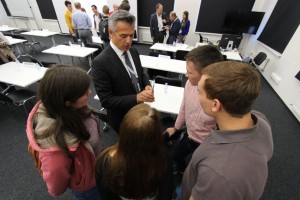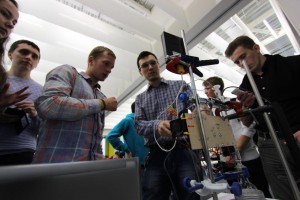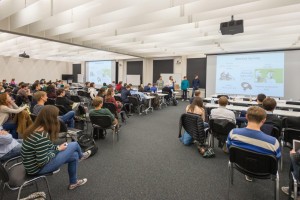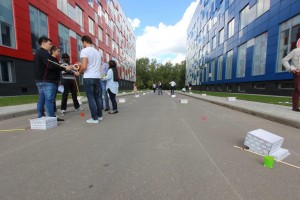What sets Skoltech apart from other universities in Russia and around the world is its focus on innovation. Today, just before the Open Innovation Forum will be hosted at the Skolkovo Technopark, we will take a deep look into one of the elements of this focus – the course called Innovation Workshop, which has been designed for Skoltech by experts in teaching innovation at MIT and which does not exist anywhere else in the world.
The first thing that Skoltech’s new students encounter in the very beginning of their study here is a month of intense, stressful, challenging, practical and enriching work. This is the Innovation Workshop, that none of the students has ever encountered in their previous studies, in some of the most distinguished universities in Russia and abroad.
“Innovation Workshop starts with three days of “Quick Success” classes, which prime students and make them believe in themselves more”, elaborates Ilia Dubinsky, Director of the Skoltech Center for Entrepreneurship and Innovation, and the living spirit behind the Workshop. “It shows the students that they can do things, which they did not even think they could, that they can do meaningful work in a field that is new to them, that they can learn very quickly and should not be afraid of the unknown. These classes also contain initial aspects of teamwork, project management, leadership”.
The Quick Success classes are followed by a number of modules that aim to give the students basic knowledge, skills and develop attitude necessary to practice innovation.
The final and most significant part of the Innovation Workshop is the Capstone Project. Working in teams, the students start their Projects by defining a problem and then embarking in a very intense 3 weeks journey to develop a solution. The work is assisted by a large group of industry experts, investors and entrepreneurs that act as mentors. The Capstones end in Finals Day, when all student teams present their project in front of peers and mentors. In addition, each team presents a working prototype that either illustrates the problem or the solution.
The main requirement of the projects is that the problems they define are real – that there are real people that need the problem solved and that the solutions features are defined by real user requirements. This year the students’ projects varied from monitoring heart condition, finding a parking space, a stair-climbing mechanical wheelchair; through smart supermarket scales, air-quality maintenance device, a smart kettle, a Braille’s glove for blind or deaf-blind people; to cheap lab equipment solution for chemical and pharmaceutical startups and many others. In a tight schedule of merely three weeks, all teams managed to produce working prototypes.
The mentors helped the teams to distill their ideas, address commercial and engineering issues. However their main focus was on assisting the teams to develop understanding of important elements of innovation process and especially the importance of working simultaneously with technology and market.
Despite the stress and long hours, the students think highly of the Workshop. “The Workshop was quite an experience”, said ShahRukh Athar, a graduate of Shiv Nadar University in Dadri, India, and now an IT student at Skoltech. “The task we had to work on was quite formidable. Making a viable innovative product, given a team of random strangers is by no means a triviality, and those past days proved it. It was exhilarating, frustrating and rewarding all at once!”
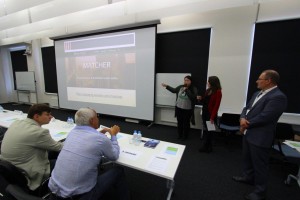
Sanzhima Garmaeva presents her team’s Capstone Project – “Matcher”, a dating-site based on biological compatibility (HLA analysis).
“The innovation workshop was really useful for me”, adds Sanzhima Garmaeva, a MSU graduate and now a biomed student at Skoltech. “First, I got contacts of people from the biotech field during the negotiation with possible partners of our Capstone Project. Even if I do not continue to develop my idea, these contacts can help me in my future career. Second, I have developed teamworking skills and understood that almost the entire success of the project depends on the team coordination and good leadership. During the Leadership course (the IW module), I realized that I have to take responsibility and share it with other team members. I think I learned how to launch an own start-up from the very beginning to success”.
“The Capstone Project is a strong initiative for development of technologies and for application of all skills practiced along the Innovation Workshop”, elaborates Zenobio Viana de Barros, a biomed student from the city of Osasco, Sao Paulo state, Brazil. “The very format of this course have made us develop, or begin to develop, a new technology in a short time. The course has had a dual purpose: in a short time we forced ourselves to build the idea and to look for the important features of the technology. If only we had more time for building the project and the prototype, we would have progressed even further”.
How did it all start?
“The Innovation Workshop was created because when Skoltech started, we admitted initial “pilot” class of 22 students, but did not have a single professor here, we had almost nothing”, explains prof. Dubinsky, “We sent the students to MIT, so that when they return, they would create the center of crystallization to the future Skoltech student cohort. These students were very bright, spoke decent English and really wanted to do innovation, but we were afraid that they were not going to be successful at MIT because of differences in culture and attitudes, and lack in some necessary skills. The reason is that Russian educational system is very traditional – it teaches knowledge and individual work, but does not teach skills and attitudes for example it is very thin on teamwork, on communication, etc.
“MIT culture is very open, collaborative, and proactive. You have to ask questions, communicate and to learn quickly, while our students are used to being given. We had to get our students into the different mode of operation in a different culture. It was a matter of developing right skills and attitudes. MIT colleagues helped us by creating Innovation Workshop to help our students develop necessary skills necessary for practicing innovation. We are especially grateful to the main architect of the course, Dr. Luis Perez-Breva.
What is innovation?
This word is used too often in today’s society, and is too often misused. At Skoltech, we believe that Innovation is the creation of something useful out of knowledge. Innovation is not a scientific discovery nor is it an invention. It is a process of creation of something useful. Innovation arises when someone capable gets a desire to make a difference,” says Ilia. “When I spoke to the students last year, some of them told me that when they were told they have to take the course about “innovation”, they thought it was going to be a waste of time, just another useless course. They were happy it was not the case.”
Can innovation be taught?
“No educational system is designed to create innovators.” says Ilia. “Generally, educational systems are designed to develop people who can comfortably live and function within society, and basically be “good citizens”, people who are somewhat “cultured” and trained to obey the orders. The innovator is a completely different person. Therefore, to train innovators we have to put the students in situations that model various aspects of innovation process and make them take responsibility and act. They have to fail, maybe multiple times, figure it out and succeed, and after that, they have to reflect on what has happened, what allowed them to succeed.
“One of the most important things that the Innovation Workshop teaches is the ability to pose a question, and to define a problem. This is probably the most difficult thing, and it is probably one of the most valuable skills one has to learn to be successful in life.
This fall, MIT Press is going to publish a book by Luis Perez-Breva, which will describe the ideas that are fundamental to the design of Innovation Workshop and the best approach to teaching innovation.”
What are the outcomes of the Workshop?
“Innovation Workshop primes the students, pushes them in the right direction, shows them that it is not scary, it is exciting, and teaches them very basic skills that allow them to start. The students come out of the Workshop with basic knowledge, skills and attitudes necessary for innovation.
“During the Workshop the students try new things, come out of their comfort zone, and start thinking about creating something useful. If we manage to continue pushing them, “putting carrots” in the right places, they will continue to experiment and eventually become innovators – use their knowledge to create something useful. Our role is to supply them with tools and resources and we have a number of programs that do just that: mentorship, the Skoltech Translational Research and Innovation Program, the Unmanned Vehicle Program, and the Knowledge Transfer Office.”
Is it possible to measure the effectiveness of the workshop?
“There is a researcher at MIT, now in an active retirement, Dr. William Lucas. He is a social researcher, one of the experts of the field that studies entrepreneurial intent (propensity to start a company). He has been studying the drivers of entrepreneurial intent. We worked with Dr. Lucas to measure the results of the Innovation Workshops and saw an undisputable evidence of a very strong positive impact of the course: the entrepreneurial intent of the students – just because they took the Innovation Workshop – grew by 50 percent, a confirmation that the Workshop worked. When we saw it first time, we realized that we should make it a regular course that every Skoltech student needs to take as the first course at Skoltech. We measured it twice at MIT and then here in Moscow, and there was no difference between the results at MIT and here – we have learned how to do it right!”
Five years later. What has changed?
“The workshop had to evolve, because initially it was designed for forty people, and it was held at MIT. This year, we had 150 students here at Skoltech. The initial workshop had four parallel Quick Success sessions over three days. This year we had sixteen, every day for three days, just because we have more people. Also, when you have 150 students in a class, it is very hard to have a meaningful discussions: when you have forty people, during an hour lecture, you can ask every single one of them to speak, when it is 150 people, it is a difficult thing. In that sense, the Innovation Workshop today is a much more difficult class to design and run.
However, by structure, intent approaches and instruments – it is almost the same. The re-design has been mostly scaling up. We have not changed much of how it is taught. However, a few things changed, e.g., I experimented this year with the Leadership, beefing up the Leadership Module.”
A new generation of innovation teachers
With 150 students to teach, it takes more than one instructor and a few lecturers to get the job done. Twenty Skoltech students and graduates, who participated in the workshop in the past, have volunteered to help as teaching assistants. “I am incredibly thankful to all of them”, says Ilia Dubinsky, “They gave back to their school and they become richer because of that.
“Before the workshop, I sent an email asking the senior students and alums if they would like to help, and twenty people came back saying “yes”. Some of them worked for as much as seven full days – early morning till late evening. Some of our alums wrote to me, saying, “Unfortunately I have a day job, but do you need help over the weekends?”
I think they are so much better off for doing that. They have learned a lot. It has probably been even a better training for them than for the students who took the course. I have seen them perform, and they were excellent. I am very happy about that. For me this is one of the highlights of the Innovation Workshop. This is becoming a tradition.”
No failure is fatal; No success is fatal
It is the end of the final Capstone presentations. The students are exhausted after a long day of, but they are remained seated, to listen to Prof. Dubinsky’s concluding remarks, summing up the whole Workshop. His speech is short, not to burden the tired students any further, but very focused and concise – he shows them where they started, and what they have achieved during this month.
On the screen behind him, a quotation from one of his favorite books – “Oh, the Places You’ll Go!” by Dr. Seuss:
And will you succeed?
Yes! You will, indeed!
(98 and 3/4 percent guaranteed)
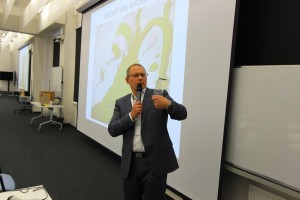
Prof. Dubinsky at the closing ceremony of Innovation Workshop 2016, holding the glass stela, and Dr. Seuss in the background.
Just before the Workshop is formally over, he gives each student a special memento – a glass stela, on which engraved the sentence “no failure is fatal, no success is final. I survived Innovation Workshop”.
Dubinsky, his team, the mentors, the lecturers and the teaching assistants have done their best to share with Skoltech’s new students their experience and know-how of doing innovation. They enriched their toolkit with skills of teamwork, communication, planning and most importantly – asking the right question. From this point on, their success in innovation is completely up to them. Are they going to use the skills they have mastered in the Workshop to create something useful out of their knowledge? First, they have to pose the right question.
